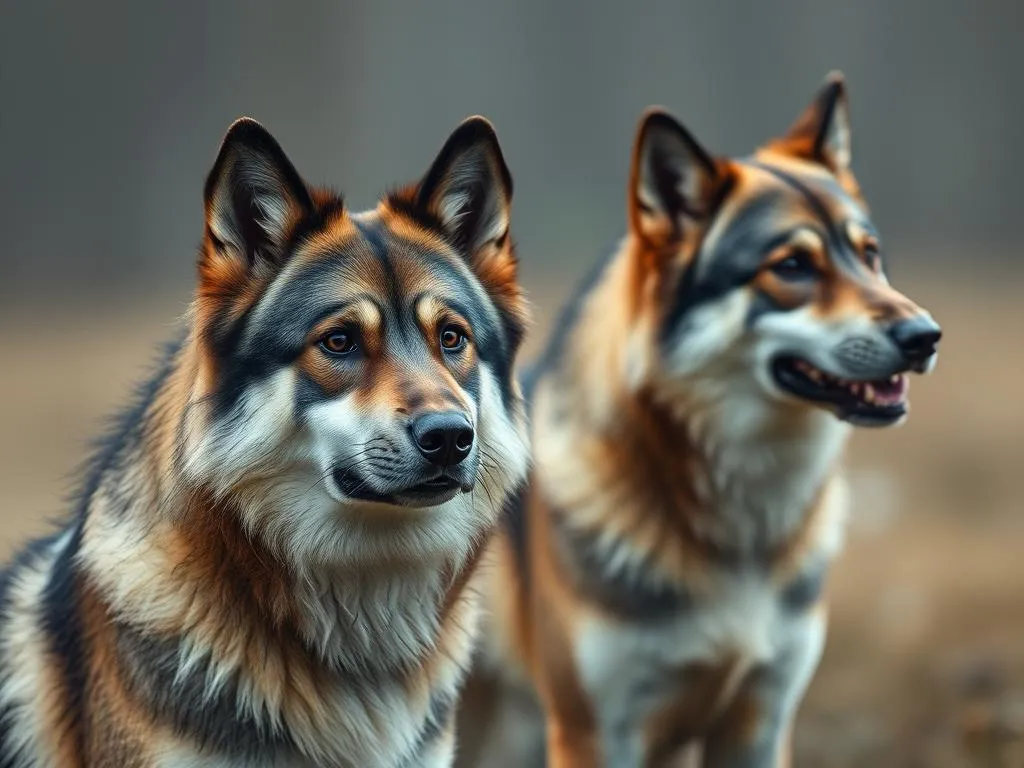
The relationship between dogs and wolves is a fascinating topic that captures the imagination of many. As members of the same family, Canidae, dogs and wolves share a significant amount of genetic material. Understanding the complexities of their relationship, particularly the potential for breeding between these two species, is crucial for anyone interested in canine genetics and hybridization phenomena.
Understanding the Canine Family
The Canidae Family
The Canidae family comprises various species, including domestic dogs (Canis lupus familiaris), gray wolves (Canis lupus), coyotes (Canis latrans), and foxes. This family is part of the order Carnivora and is characterized by members that are typically social, territorial, and carnivorous.
The evolutionary background of dogs and wolves is particularly interesting. Dogs are believed to have descended from wolves thousands of years ago when early humans began domesticating them. This domestication process involved selective breeding, which led to the diverse array of dog breeds we see today. Despite their domestication, dogs and wolves share many behavioral and physical traits due to their common ancestry.
Domestication of Dogs
The timeline of dog domestication spans over 15,000 years, with some estimates suggesting it could be as much as 30,000 years. Early humans likely began to tame wolves to assist with hunting and provide protection. Over generations, these wolves adapted to living alongside humans, leading to the domesticated dogs we know today.
While dogs have become increasingly reliant on humans for food and shelter, wolves remain wild and self-sufficient. This difference has led to notable distinctions between domesticated dogs and wild wolves, particularly in behavior, social structure, and physical traits.
Genetic Compatibility
Chromosomal Similarity
A critical factor in determining whether dogs can breed with wolves is their genetic compatibility. Both species have a similar number of chromosomes—dogs have 78 chromosomes, while wolves also have 78. This chromosomal similarity means that they can interbreed, resulting in viable offspring known as wolf-dog hybrids.
The ability to breed between species is largely dependent on chromosomal compatibility. In the case of dogs and wolves, this compatibility is quite high, allowing for successful mating and hybridization.
Hybrid Vigor and Genetic Diversity
Hybrid vigor, or heterosis, refers to the phenomenon where hybrid offspring display improved or enhanced biological qualities compared to their parents. In the case of wolf-dog hybrids, this can manifest as superior physical health, better adaptability, and increased lifespan.
Genetic diversity is essential in any breeding program, as it helps reduce the likelihood of inherited diseases and strengthens the population’s overall health. When dogs and wolves interbreed, the resulting hybrids often benefit from this increased genetic diversity, making them a unique blend of both species.
Hybridization: Dogs and Wolves
Wolf-Dog Hybrids
Wolf-dog hybrids are the offspring resulting from the mating of a domestic dog and a wolf. These hybrids can exhibit a wide range of appearances and behaviors, depending on the breeds involved and the percentage of wolf genes they inherit.
Misconceptions surrounding wolf-dog hybrids are common. Many people romanticize these creatures, viewing them as exotic pets. However, they often possess unpredictable behaviors and unique needs that can make them challenging to care for.
Mating Behavior
Wolves have distinct mating rituals that are influenced by their social structures. Mating typically occurs once a year during the breeding season, which varies by region but often falls between late winter and early spring. Wolves form strong pair bonds, and both partners participate in raising their young.
Dogs, on the other hand, have a more flexible breeding schedule, allowing them to mate at various times throughout the year. Their mating behaviors are often less ritualistic and more opportunistic compared to wolves. Understanding these differences is essential for anyone considering the implications of breeding between dogs and wolves.
Legal and Ethical Considerations
Legality of Owning Hybrid Animals
The legality of owning wolf-dog hybrids varies significantly around the world and even within regions. Some areas have strict regulations, while others may allow ownership with minimal restrictions. Potential owners should research the laws in their specific location before acquiring a wolf-dog hybrid.
In many places, owning a wolf-dog hybrid requires specific permits, and in some cases, it may be entirely prohibited. These regulations aim to protect both the animals and the public from potential dangers associated with hybridization.
Ethical Concerns
The ethical considerations surrounding the breeding of dogs and wolves are complex. There are significant animal welfare issues tied to the ownership and breeding of hybrids. Many hybrids end up in shelters due to their unpredictable behavior and high exercise needs, leading to a cycle of abandonment and mistreatment.
Moreover, hybridization can pose risks to wild wolf populations and ecosystems. The introduction of hybrid individuals into wild populations can disrupt genetic integrity and affect the natural behaviors of wolf packs. It’s crucial to weigh these ethical considerations carefully when discussing the topic of interbreeding between dogs and wolves.
Caring for Hybrid Dogs
Unique Needs of Wolf-Dog Hybrids
Wolf-dog hybrids often require specialized care that differs from standard dog ownership. They may exhibit more wolf-like behaviors, such as higher prey drives, social hierarchies, and territorial instincts. Consequently, they may not be suitable for first-time dog owners or families with small children.
Training and socialization are critical for wolf-dog hybrids. They require consistent, firm, and positive reinforcement training to develop good behavior and adapt to living in a human environment. Early socialization with other animals and humans is vital to prevent fear and aggression issues from developing.
Health Considerations
Wolf-dog hybrids can be prone to specific health issues, some of which may be inherited from either parent. Common health concerns include hip dysplasia, behavioral problems, and dietary sensitivities. Regular veterinary care is essential to monitor their health and catch any issues early.
Potential owners should be prepared for the commitment that comes with caring for a hybrid. Regular exercise, mental stimulation, and a proper diet are all crucial components for maintaining a wolf-dog hybrid’s health and well-being.
Conclusion
Understanding whether dogs can breed with wolves involves exploring the genetic compatibility, behavioral traits, and ethical considerations surrounding this unique relationship. While hybridization between these two species is possible, it comes with a host of responsibilities and challenges that potential owners must be aware of.
The implications of dog-wolf breeding extend beyond individual pets; they touch on broader ecological and ethical issues that merit thoughtful consideration. As such, responsible pet ownership and awareness of the unique challenges hybrid animals present are paramount for anyone interested in this topic.
FAQs
Can all dog breeds interbreed with wolves?
Yes, all domestic dog breeds can interbreed with wolves due to their genetic compatibility.
What are the differences between wolf-dog hybrids and regular dogs?
Wolf-dog hybrids often exhibit more wild behaviors, higher prey drives, and specific social needs compared to regular dogs.
Are wolf-dog hybrids suitable as family pets?
Wolf-dog hybrids may not be suitable for families, especially those with young children, due to their unpredictable behaviors and high exercise needs.
How can one identify a wolf-dog hybrid?
Identifying a wolf-dog hybrid can be challenging; however, physical traits like size, coat type, and behavioral characteristics can provide clues. DNA testing is the most reliable method for confirmation.
References
- [ ] Credible sources and studies related to canine genetics and hybridization.









